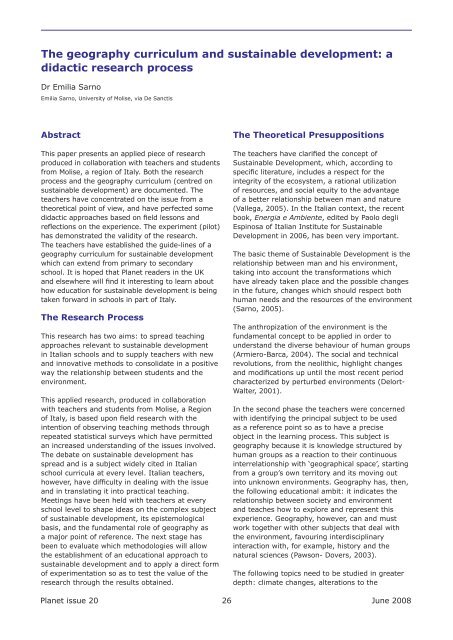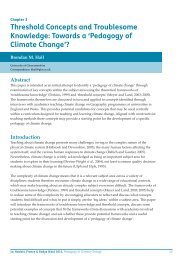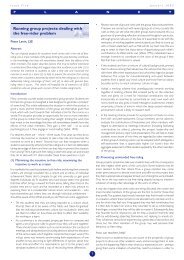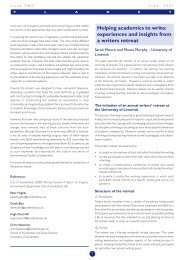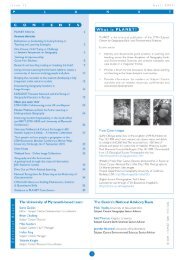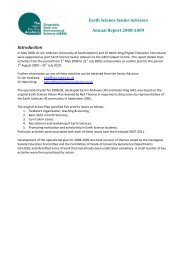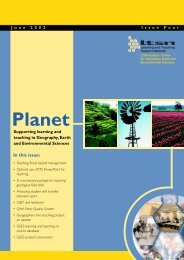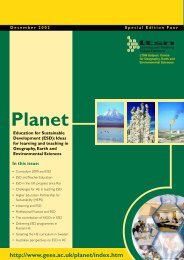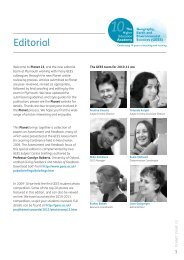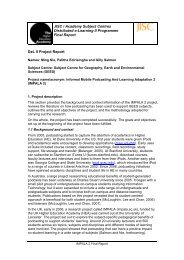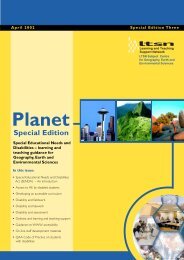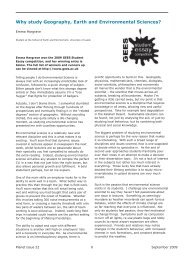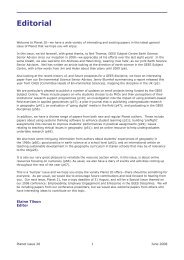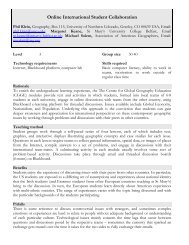The geography curriculum and sustainable development
The geography curriculum and sustainable development
The geography curriculum and sustainable development
You also want an ePaper? Increase the reach of your titles
YUMPU automatically turns print PDFs into web optimized ePapers that Google loves.
<strong>The</strong> <strong>geography</strong> <strong>curriculum</strong> <strong>and</strong> <strong>sustainable</strong> <strong>development</strong>: a<br />
didactic research process<br />
Dr Emilia Sarno<br />
Emilia Sarno, University of Molise, via De Sanctis<br />
Abstract<br />
This paper presents an applied piece of research<br />
produced in collaboration with teachers <strong>and</strong> students<br />
from Molise, a region of Italy. Both the research<br />
process <strong>and</strong> the <strong>geography</strong> <strong>curriculum</strong> (centred on<br />
<strong>sustainable</strong> <strong>development</strong>) are documented. <strong>The</strong><br />
teachers have concentrated on the issue from a<br />
theoretical point of view, <strong>and</strong> have perfected some<br />
didactic approaches based on fi eld lessons <strong>and</strong><br />
reflections on the experience. <strong>The</strong> experiment (pilot)<br />
has demonstrated the validity of the research.<br />
<strong>The</strong> teachers have established the guide-lines of a<br />
<strong>geography</strong> <strong>curriculum</strong> for <strong>sustainable</strong> <strong>development</strong><br />
which can extend from primary to secondary<br />
school. It is hoped that Planet readers in the UK<br />
<strong>and</strong> elsewhere will fi nd it interesting to learn about<br />
how education for <strong>sustainable</strong> <strong>development</strong> is being<br />
taken forward in schools in part of Italy.<br />
<strong>The</strong> Research Process<br />
This research has two aims: to spread teaching<br />
approaches relevant to <strong>sustainable</strong> <strong>development</strong><br />
in Italian schools <strong>and</strong> to supply teachers with new<br />
<strong>and</strong> innovative methods to consolidate in a positive<br />
way the relationship between students <strong>and</strong> the<br />
environment.<br />
This applied research, produced in collaboration<br />
with teachers <strong>and</strong> students from Molise, a Region<br />
of Italy, is based upon fi eld research with the<br />
intention of observing teaching methods through<br />
repeated statistical surveys which have permitted<br />
an increased underst<strong>and</strong>ing of the issues involved.<br />
<strong>The</strong> debate on <strong>sustainable</strong> <strong>development</strong> has<br />
spread <strong>and</strong> is a subject widely cited in Italian<br />
school curricula at every level. Italian teachers,<br />
however, have difficulty in dealing with the issue<br />
<strong>and</strong> in translating it into practical teaching.<br />
Meetings have been held with teachers at every<br />
school level to shape ideas on the complex subject<br />
of <strong>sustainable</strong> <strong>development</strong>, its epistemological<br />
basis, <strong>and</strong> the fundamental role of <strong>geography</strong> as<br />
a major point of reference. <strong>The</strong> next stage has<br />
been to evaluate which methodologies will allow<br />
the establishment of an educational approach to<br />
<strong>sustainable</strong> <strong>development</strong> <strong>and</strong> to apply a direct form<br />
of experimentation so as to test the value of the<br />
research through the results obtained.<br />
<strong>The</strong> <strong>The</strong>oretical Presuppositions<br />
<strong>The</strong> teachers have clarified the concept of<br />
Sustainable Development, which, according to<br />
specific literature, includes a respect for the<br />
integrity of the ecosystem, a rational utilization<br />
of resources, <strong>and</strong> social equity to the advantage<br />
of a better relationship between man <strong>and</strong> nature<br />
(Vallega, 2005). In the Italian context, the recent<br />
book, Energia e Ambiente, edited by Paolo degli<br />
Espinosa of Italian Institute for Sustainable<br />
Development in 2006, has been very important.<br />
<strong>The</strong> basic theme of Sustainable Development is the<br />
relationship between man <strong>and</strong> his environment,<br />
taking into account the transformations which<br />
have already taken place <strong>and</strong> the possible changes<br />
in the future, changes which should respect both<br />
human needs <strong>and</strong> the resources of the environment<br />
(Sarno, 2005).<br />
<strong>The</strong> anthropization of the environment is the<br />
fundamental concept to be applied in order to<br />
underst<strong>and</strong> the diverse behaviour of human groups<br />
(Armiero-Barca, 2004). <strong>The</strong> social <strong>and</strong> technical<br />
revolutions, from the neolithic, highlight changes<br />
<strong>and</strong> modifications up until the most recent period<br />
characterized by perturbed environments (Delort-<br />
Walter, 2001).<br />
In the second phase the teachers were concerned<br />
with identifying the principal subject to be used<br />
as a reference point so as to have a precise<br />
object in the learning process. This subject is<br />
<strong>geography</strong> because it is knowledge structured by<br />
human groups as a reaction to their continuous<br />
interrelationship with ‘geographical space’, starting<br />
from a group’s own territory <strong>and</strong> its moving out<br />
into unknown environments. Geography has, then,<br />
the following educational ambit: it indicates the<br />
relationship between society <strong>and</strong> environment<br />
<strong>and</strong> teaches how to explore <strong>and</strong> represent this<br />
experience. Geography, however, can <strong>and</strong> must<br />
work together with other subjects that deal with<br />
the environment, favouring interdisciplinary<br />
interaction with, for example, history <strong>and</strong> the<br />
natural sciences (Pawson- Dovers, 2003).<br />
<strong>The</strong> following topics need to be studied in greater<br />
depth: climate changes, alterations to the<br />
Planet issue 20 26 June 2008<br />
Planet 20 text.indd 26 25/06/2008 09:51:21:
ecosystems, the utilization of water resources, <strong>and</strong><br />
desertification. Pollution of the atmosphere creates<br />
an imbalance which has effects on the entire<br />
biosphere. Water is a precious resource which is<br />
being polluted <strong>and</strong> which is scarce in some areas<br />
of the earth. Deforestation accelerates the loss of<br />
biodiversity <strong>and</strong> causes hydrological imbalance.<br />
<strong>The</strong> last point to be dealt with by teachers was to<br />
choose the didactic methods with which to deal<br />
with the subject with their students <strong>and</strong>, above<br />
all, to create didactic projects which were practical<br />
<strong>and</strong> which allowed the <strong>development</strong> of students’<br />
abilities through direct experience.<br />
Education for Sustainable Development must be<br />
participative, based upon research <strong>and</strong> discovery<br />
(Sarno, 2006b); particular attention must be given<br />
to observation <strong>and</strong> interpretation. Two phases<br />
can be outlined when elaborating a <strong>geography</strong><br />
<strong>curriculum</strong> of study: one for Primary education <strong>and</strong><br />
another for Secondary education. At the primary<br />
stage of education, exploration, direct experience<br />
<strong>and</strong> fi rst-h<strong>and</strong> observation are fundamental; whilst<br />
at the secondary level, reflection upon the sources<br />
of knowledge, documentary research <strong>and</strong> attention<br />
to planning are primary concerns (De Vecchis-<br />
Staluppi, 2004).<br />
<strong>The</strong> Experimental Stage<br />
After having perfected these guide-lines, the<br />
teachers began the experimental phase of the<br />
research: they programmed the didactic plans<br />
which were composed of fi eld work, periods of<br />
study, <strong>and</strong> the <strong>development</strong> of projects. <strong>The</strong>y aided<br />
the students in appreciating the importance of a<br />
fi rst-h<strong>and</strong> discovery of environmental problems<br />
<strong>and</strong> issues, <strong>and</strong> they stimulated them towards a<br />
personal reflection <strong>and</strong> the <strong>development</strong> of projectwork.<br />
In this way they become directly involved<br />
with <strong>sustainable</strong> <strong>development</strong>.<br />
For each school level a plan was established in the<br />
school’s region which included a study of a specific<br />
issue (waste products, water pollution, uncontrolled<br />
forest clearing), data collection <strong>and</strong> information,<br />
<strong>and</strong> analysis of the forms of <strong>sustainable</strong><br />
management of resources or materials.<br />
<strong>The</strong> fi rst set of data collected was from elementary<br />
school pupils. It was observed that the children<br />
not only had little knowledge of the subject, but<br />
also little familiarity with their environment. It<br />
thus becomes even more necessary to favour an<br />
improved familiarity with the environment <strong>and</strong><br />
to make the pupils pay greater attention to the<br />
environmental affects of human activity. <strong>The</strong> pupils’<br />
drawings highlighted a growing awareness of the<br />
issues faced. <strong>The</strong>y also engaged in trying to fi nd<br />
possible solutions for each individual issue.<br />
This experiment clearly demonstrated its utility.<br />
It was also advantageous in promoting a greater<br />
knowledge of <strong>geography</strong> as direct personal<br />
experience was an incentive to study <strong>and</strong> allowed<br />
for the <strong>development</strong> of the necessary skills.<br />
<strong>The</strong> results of the research <strong>and</strong><br />
the <strong>development</strong> of the <strong>geography</strong><br />
<strong>curriculum</strong> for <strong>sustainable</strong><br />
<strong>development</strong><br />
Following the experimental phase, the teachers<br />
thought it opportune to apply similar programmes<br />
in schools of every level <strong>and</strong> type, as well as<br />
to develop a valid <strong>curriculum</strong> for Sustainable<br />
Development in line with a knowledge of<br />
<strong>geography</strong>. <strong>The</strong>y also indicated the topics to be<br />
dealt with <strong>and</strong> the teaching methods to be used in<br />
schools. I cooperated with the teachers in planning<br />
the <strong>curriculum</strong> for Sustainable Development as<br />
outlined below.<br />
3.1 Primary School<br />
Space is a category of knowledge which<br />
develops due to a continuous interaction with<br />
the environment, which is understood as both a<br />
place of sensory input <strong>and</strong> of orientation. In this<br />
sense, the exploration of the environment is of<br />
fundamental importance <strong>and</strong> requires a capacity of<br />
observation in order to underst<strong>and</strong> the territorial<br />
structures. An internalization of this logic, through<br />
spatial-environmental activities, allows the<br />
<strong>development</strong> of cognitive mapping <strong>and</strong> facilitates<br />
graphic representation by creating a link between<br />
observation <strong>and</strong> description. Exploration of the<br />
environment predisposes primary school children<br />
to relate knowingly <strong>and</strong> aids the <strong>development</strong> of<br />
cognitive mapping. Children will also learn the<br />
importance of the environment <strong>and</strong> develop a<br />
sense of respect for the natural world.<br />
3.2 Elementary School<br />
Upon moving to elementary school, the interaction<br />
between society/environment has to be both<br />
experienced <strong>and</strong> reflected upon in an abstract<br />
manner, that is to say it becomes necessary<br />
to reason about the relationship which exists<br />
between the two. Teaching must be presented<br />
on a local scale via analyses of both specific<br />
situations <strong>and</strong> of the transformations brought<br />
about by human activity: use must be made of<br />
direct personal discovery. <strong>The</strong> elements present<br />
in the geographical spatial context reveal how<br />
every aspect of the territory is the result of socio-<br />
Planet issue 20 27 June 2008<br />
Planet 20 text.indd 27 25/06/2008 09:51:21:
economic <strong>and</strong> cultural processes. <strong>The</strong> gradual<br />
exploration of the territory system will make<br />
comprehensible the modifications made by man<br />
through time. Students will begin to think of how to<br />
use the resources available in an equitable manner.<br />
This stage must be linked to students creating their<br />
fi rst personal idea on <strong>sustainable</strong> <strong>development</strong> <strong>and</strong><br />
how to live sustainably.<br />
3.3 Middle School<br />
During the middle school years students should<br />
learn a deeper form of analysis of the society/<br />
environment relationship using the different spatial<br />
scales, by studying the European regions. <strong>The</strong>ir<br />
interest should be directed to the industrial process<br />
in all its complexity <strong>and</strong> to the different forms<br />
of social <strong>and</strong> environmental impact it produces.<br />
This analysis should be linked to the study of the<br />
political process behind <strong>development</strong> so as to<br />
be able to determine how the industrial system<br />
developed, the differences between the rich<br />
nations <strong>and</strong> the poor (those outside the process of<br />
industrial <strong>development</strong>) <strong>and</strong> the different forms of<br />
pollution.<br />
Learning must be accompanied by an<br />
underst<strong>and</strong>ing of policy; students should learn<br />
about how to make positive modifications to the<br />
environment, to improve deteriorated l<strong>and</strong>scapes,<br />
<strong>and</strong> to propose responsible utilization of resources.<br />
3.4 Secondary School<br />
Two major themes need to be dealt with in<br />
secondary school: the interrelationship between<br />
society/environment at the global level <strong>and</strong> an<br />
adequate analysis of the philosophical dimension<br />
of this relationship. Knowledge at the global level<br />
is necessary in order to underst<strong>and</strong> international<br />
protocols <strong>and</strong> the interdependence between local<br />
<strong>and</strong> global political decisions. Furthermore, an<br />
analysis of globalization as an economic process<br />
will help to develop an underst<strong>and</strong>ing of the value<br />
of unified planning in dealing with environmental<br />
problems.<br />
<strong>The</strong> <strong>geography</strong> <strong>curriculum</strong> will then be completed<br />
by a philosophical reflection on the relationship<br />
between society/geographic space because this will<br />
allow the students to become more aware of the<br />
use made of resources <strong>and</strong> of the importance of<br />
the environmental context for society. In this way<br />
they will acquire an underst<strong>and</strong>ing of Sustainable<br />
Development in a way which is appropriate both<br />
for society <strong>and</strong> for the natural environment.<br />
<strong>The</strong> students should, in the fi nal stages of the<br />
educational process, possess the tools necessary<br />
for an analysis <strong>and</strong> interpretation of environmental<br />
problems from the scientific, economic <strong>and</strong> political<br />
points of view. Finally, students should be exercised<br />
in the elaboration of functional interventions, by<br />
an appropriate use in their work of the language of<br />
cartography <strong>and</strong> information science.<br />
Conclusions<br />
This research has allowed the <strong>development</strong> of<br />
a <strong>curriculum</strong> for <strong>sustainable</strong> <strong>development</strong> to be<br />
included as a part of geographical knowledge <strong>and</strong><br />
the organization of a series of didactic stages<br />
suitable for each student age. This was made<br />
possible by reflecting upon the epistemological<br />
aspects of this topic. However, the epistemological<br />
aspect of the subject can have a strong educational<br />
value if the ethical dimension is kept clearly in<br />
mind. Issues such as: respect for the environment,<br />
respect for resources, correct human approaches,<br />
<strong>and</strong> attention to those processes that will have<br />
an impact on future generations. Without these<br />
values, knowledge of this subject would be dry<br />
<strong>and</strong> unproductive. Knowledge of the anthropization<br />
of the environment must not be separated from<br />
discussing <strong>and</strong> debating ecological ethics <strong>and</strong><br />
sound values.<br />
References<br />
Armiero, M., <strong>and</strong> S. BARCA (2004) Storia dell’ambiente.<br />
Roma: Carocci Delort, R., <strong>and</strong> F. Walter (2001) Histoire<br />
de l’envinnement européen. Presses Universitaires de<br />
France.<br />
Degli Espinosa, P. (eds) (2006) Energia e ambiente<br />
dopo Kyoto. Italian Istitute for Sustainable Development:<br />
Edizioni Ambiente<br />
De Vecchis, G.,<strong>and</strong> G.A.Staluppi. (2004) Didattica della<br />
geografia. Torino: UTET<br />
MC Neill, J.R (2000) Something new under the sun. A<br />
environmental history of the twentienth-century world.<br />
Norton<br />
Pawson, E., <strong>and</strong> S. Dovers (2003) Environmental<br />
History <strong>and</strong> the Challenges Interdisciplinarity: An<br />
Antipodean Perspective in Environment <strong>and</strong> History. 9(1).<br />
53-75.<br />
Sarno, E. (2006a) On the environmental history in<br />
Molise:”an approach to the sources of the 1800’s in<br />
Cultural heritage <strong>and</strong> <strong>sustainable</strong> forest management: the<br />
role of traditional knowledge. Warszawa. 521-524.<br />
Sarno, E. (2006b) Modelli e indicatori della progettazione<br />
ambientale in Valutazione ed autovalutazione. IRRE<br />
Molise. 83-88.<br />
Sarno, E. (2005) Vedute in prospettiva- I segni del<br />
tempo sull’ambiente in Sapere. 4. 62-69<br />
Sarno, E. (2002) Ripensiamo la geografia, Roma: Kappa<br />
Vallega, A. (1995) La regione, sistema territoriale<br />
sostenibile. Milano: Mursia<br />
Emilia Sarno, University of Molise,<br />
via De Sanctis<br />
sarno@unimol.it<br />
Planet issue 20 28 June 2008<br />
Planet 20 text.indd 28 25/06/2008 09:51:21:


